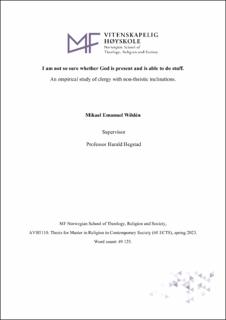I am not so sure whether God is present and is able to do stuff. An empirical study of clergy with non-theistic inclinations
Master thesis
Permanent lenke
https://hdl.handle.net/11250/3096977Utgivelsesdato
2023Metadata
Vis full innførselSamlinger
Sammendrag
This is an empirical qualitative study of six pastors of the Church of Norway, who to differing degrees hold a non-theistic view of God. That is to say that they to different degrees suspect or believe that it is meaningless to talk of God´s existence, that we are unable to say anything meaningful of the essence of God, and that God does not intervene in our physical world. The question is how these pastors interpret and communicate their image of God. Can they speak openly of their image of God? Are there parts of their work that conflicts with their image of God? Have they developed linguistical strategies or liturgical tricks to correct or nuance how the ideas of the divine is communicated?
I have conducted in-depth semi-structured interviews of six self-selected pastors of Church of Norway, and I have used grounded theory to inductively develop theory from the interviews. In addition, I have considered the theories of theopoetics, Caputo´s idea regarding the weakness of God, D. Z. Phillips´ ideas regarding religion as practices, and the theories developed by Dennett and LaScola in response to their studies of clergy who has lost belief.
A couple of the many conclusions that I have made is that they tend to speak very careful of how God might not be said to exist, how objective knowledge about God is inaccessible, and about how we are unable to say anything meaningful of the essence of God. They are however very clear in their dismissals of every sign of a judgmental God. Many also seem to find a peace in religious practices, even though they either find them unintelligible or that they lack a mental state of assent to them.
